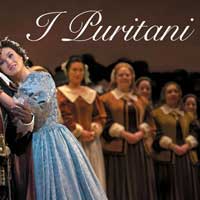
 [rating=4] The Lyric Opera’s current production of I Puritani, which was originally directed by Sandro Sequi in 1976, foregrounds the person of its composer, Vincenzo Bellini, and understandably so. Premiering in 1835, just a few months before his untimely death, I Puritani epitomizes Bellini’s style, with its long, elaborate melodies, lyricism, and contrasting sections of music to represent shifts in character. Therefore, during its lengthy scene transitions set designer Ming Cho Lee provides a romantic landscape scrim that prominently features Bellini’s name, cleverly using our respect for the composer to beg our indulgence. It’s a choice that works in this revival quite well due to the music being performed by an all-star cast led by the sensitive, passionate conducting of Enrique Mazzola, an acclaimed interpreter of the bel canto period.
[rating=4] The Lyric Opera’s current production of I Puritani, which was originally directed by Sandro Sequi in 1976, foregrounds the person of its composer, Vincenzo Bellini, and understandably so. Premiering in 1835, just a few months before his untimely death, I Puritani epitomizes Bellini’s style, with its long, elaborate melodies, lyricism, and contrasting sections of music to represent shifts in character. Therefore, during its lengthy scene transitions set designer Ming Cho Lee provides a romantic landscape scrim that prominently features Bellini’s name, cleverly using our respect for the composer to beg our indulgence. It’s a choice that works in this revival quite well due to the music being performed by an all-star cast led by the sensitive, passionate conducting of Enrique Mazzola, an acclaimed interpreter of the bel canto period.
The action is set in a Parliamentarian encampment near the end of the English Civil War. Elvira Walton (Albina Shagimuratova) desires to marry the Royalist Lord Arturo Talbot (Lawrence Brownlee), disappointing her Puritan admirer, Sir Riccardo Forth (Anthony Clark Evans). Much to her surprise, her father agrees to the union. But when Arturo arrives for the wedding, he discovers that the deposed king’s widow, Queen Enrichetta (Lauren Decker) is being held prisoner and is likely to be killed. Forsaking his chance at marriage, he helps the queen escape and is forced to flee with her. Thinking her fiancé is a traitor, Elvira descends into madness, prompting a crisis of conscience in Riccardo.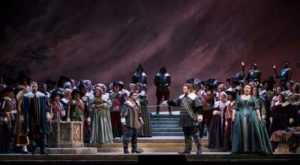
The production’s design is realistic, which creates a challenge for revival director Eric Einhorn. Mazzola keeps the music lively despite many of the early sections having the slow pace of a hymnal or march, but Einhorn’s excuses for giving the actors stage business are sometimes desperate and mismatched in tempo. This problem mostly resolves with Riccardo’s aria “Ah! Per sempre …Bel sogno beato,” which showcases how melodious a baritone Evans is and how well he follows Bellini’s directive to let the emotion live in the music. In this case, Riccardo is ruminating on his disappointment to his friend, Sir Bruno Robertson (Alec Carlson, who is a memorable stage presence even in this brief role). The same music is heard at other points throughout the opera and each time the actors use it to achieve a different effect, expressing feelings ranging from pity and confoundment to triumph and joy.
Shagimuratova was last seen at the Lyric in the title role of Lucia di Lammermoor, and the soprano has returned in fine form ready to breathe psychological plausibility into another dramatically challenging character. Even her first recitative is a clear, vivacious peal, and she only gets stronger from there. Matching her strength in their duet is Adrian Sâmpetrean in the role of her uncle, Sir Giorgio Wallace. The warmth of the bass’s voice matches that of his character, and the emotional connection between them sets up his later duet with Riccardo, “Suoni la tromba,” during which the audience clearly feels just how much his niece means to him and how hard he must fight to convince Riccardo to put her needs first. It’s a truly stirring moment.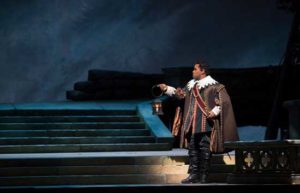
Sir Arturo is given a lengthy introduction by the staging and music as a crowd of people gather out of curiosity about the Royalist defector, and Brownlee does not disappoint. His signature coloratura is dialed down slightly from his appearance in La Cenerentola a few years back, but he’s an ebullient presence. Indeed, his scene with Enrichetta only works dramatically because he’s so boyishly charismatic, which contrasts humorously with Decker’s interpretation of Enrichetta as frustrated with the tortured antics necessary to set up the mistaken-identity plot. When he reappears in Act III, he is allowed to behave more naturalistically and it’s safe to say that the audience is fully rooting for him. Up until the final moment, there had still been a bit of tension between the music and the old-fashioned staging. During her mad scene, the torch-bearing Elvira looked uncomfortably like Miss Havisham, but Shagimuratova’s interpretation of the iconic “Qui la voce sua soave” really does live up to how much its hyped. The audience sat completely transfixed throughout the long, complex aria’s mediation on denial and grief. When the lovers are finally reunited, they amaze with their high notes in the duet “Credeasi, misera,” which feels like a fully earned moment for their characters as well as a chance to dazzle with their incredible skill and a parting gift from Bellini.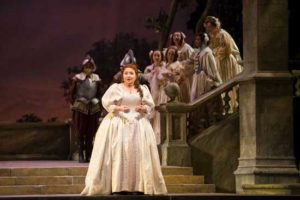
I Puritani will continue at the Civic Opera House, 20 N Upper Wacker Drive, Chicago, thru February 28, with the following showtimes:
February 13: 7:30 pm
February 16: 7:30 pm
February 24: 7:30 pm
February 28: 2:00 pm
Running time is three hours and thirty minutes with two intermissions.
The Lyric offers parking deals with Poetry Garage at 201 W Madison St. if inquired about in advance. Tickets are $20-269; to order, visit LyricOpera.org or call 321-827-5600.
To see what others are saying, visit www.theatreinchicago.com, go to Review Round-Up and click at “I Puritani.”

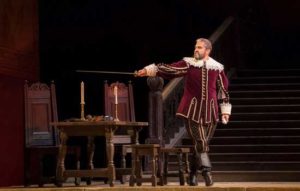





More Stories
“Guys & Dolls”
“The Music Man”
“The S Paradox” reviewed by Julia W. Rath